初中生英语学习计划有哪些
七年级英语学习计划3篇
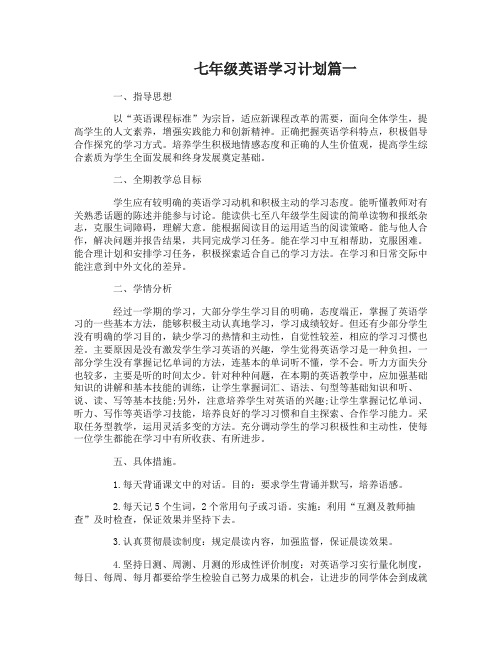
七年级英语学习计划篇一一、指导思想以“英语课程标准”为宗旨,适应新课程改革的需要,面向全体学生,提高学生的人文素养,增强实践能力和创新精神。
正确把握英语学科特点,积极倡导合作探究的学习方式。
培养学生积极地情感态度和正确的人生价值观,提高学生综合素质为学生全面发展和终身发展奠定基础。
二、全期教学总目标学生应有较明确的英语学习动机和积极主动的学习态度。
能听懂教师对有关熟悉话题的陈述并能参与讨论。
能读供七至八年级学生阅读的简单读物和报纸杂志,克服生词障碍,理解大意。
能根据阅读目的运用适当的阅读策略。
能与他人合作,解决问题并报告结果,共同完成学习任务。
能在学习中互相帮助,克服困难。
能合理计划和安排学习任务,积极探索适合自己的学习方法。
在学习和日常交际中能注意到中外文化的差异。
二、学情分析经过一学期的学习,大部分学生学习目的明确,态度端正,掌握了英语学习的一些基本方法,能够积极主动认真地学习,学习成绩较好。
但还有少部分学生没有明确的学习目的,缺少学习的热情和主动性,自觉性较差,相应的学习习惯也差。
主要原因是没有激发学生学习英语的兴趣,学生觉得英语学习是一种负担,一部分学生没有掌握记忆单词的方法,连基本的单词听不懂,学不会。
听力方面失分也较多,主要是听的时间太少。
针对种种问题,在本期的英语教学中,应加强基础知识的讲解和基本技能的训练,让学生掌握词汇、语法、句型等基础知识和听、说、读、写等基本技能;另外,注意培养学生对英语的兴趣;让学生掌握记忆单词、听力、写作等英语学习技能,培养良好的学习习惯和自主探索、合作学习能力。
采取任务型教学,运用灵活多变的方法。
充分调动学生的学习积极性和主动性,使每一位学生都能在学习中有所收获、有所进步。
五、具体措施。
1.每天背诵课文中的对话。
目的:要求学生背诵并默写,培养语感。
2.每天记5个生词,2个常用句子或习语。
实施:利用“互测及教师抽查”及时检查,保证效果并坚持下去。
3.认真贯彻晨读制度:规定晨读内容,加强监督,保证晨读效果。
初中生怎样学好英语的方法技巧

初中生怎样学好英语的方法技巧
学好英语的方法和技巧可以有很多,具体如下:
1. 建立良好的学习习惯:每天定期安排一定的学习时间,保持学习的连贯性和稳定性。
2. 听英语:多听英语音频、看英语视频或听英语歌曲,提高听力和语感。
3. 说英语:多参加英语口语练习,可以跟同学、老师或英语角的朋友交流,提高口语表达能力。
4. 读英语:阅读英文文章、报纸、杂志或英语小说,提高阅读理解和词汇量。
5. 写英语:每天写一些英语日记、作文,练习写作技巧和语法运用。
6. 制定学习计划:根据自己的学习情况和目标,制定长期和短期的学习计划,明确每天要学习的内容和目标。
7. 多做练习:参加英语考试的学生可以多做一些相关试题,找到自己薄弱的地方并加以改进。
8. 找到适合自己的学习方法:不同的人有不同的学习方法,找到适合自己的方
法,多试验和尝试。
9. 使用学习资源:利用英语学习网站、词典、语法书籍等各种学习资源来辅助学习。
10. 保持积极的学习态度:养成积极向上的学习态度,相信自己一定能够取得进步,坚持下去。
英语学习制定学习目标和计划(汇总1)

英语学习制定学习目标和计划(汇总1)篇1:制定学习英语计划同学们大家知道制定学习计划英语怎么写吗,赶紧来看看范文吧。
Make A Study Plan作为一名初中生,我的学习负担比以前更重了。
因此,我必须给我的学习制定计划从而使努力更有效果,同时腾出一些时间去玩。
首先,我会为这学期制定一个大的计划并设立目标。
我想要在期末考试中取得前三名,所以我必须为之努力。
其次,我会制定几个短期的计划,比如说月计划和周计划。
这样一来,我就能够清楚的知道我主要的不同的任务是什么。
最后,每日计划也是必要的。
写下我每天的任务并严格完成它们,记住不要把今天的任务留给明天。
有了这些不同的计划,我就可以合理的安排时间,并抽出时间来玩。
篇2:制定学习英语计划1.合理分配时间。
可将自己的学习时间分为两块,常规学习时间主要用于完成当天的学习任务,复习和消化当天的学习内容,形成短时记忆,并在周复习或月复习时将此转为长时记忆;自由学习时间可用于补习或提高,以此来增强自身的优势与特长。
因此自由学习时间应当成为制订学习计划的重点内容。
2.长计划短安排。
在较长的时间内,究竟做什么应有大致计划。
比如,一个学期、一个学年究竟要达到什么目标应当结合计划和目标有个长期计划。
但实际学习时变化很多,又难以预测,因此长计划不可太具体。
但当周、当月及下学期要解决什么问题,应心中有数,而每天做什么应更加具体。
这样把一项较大的任务分配到每周、每天去完成,使长期计划中的任务逐步得到实现。
3.突出重点。
学习时间是有限的,而学习的内容是无限的,所以必须有重点,要保证重点,兼顾一般。
所谓重点:一是指自己学习中的弱科;二是指知识体系中的重点内容。
制定计划时,应将主要的时间和精力放在重点上,既解决当前的问题,又逐步构建自己的知识体系。
4.脚踏实地。
有些学生订计划时满腔热情,但行动起来却寸步难行,这是因为目标定得过高、计划订得过死、脱离实际情况的缘故。
这里的实际情况是指:①知识能力的实际:每个阶段,在计划中要接受消化多少知识?要培养哪些能力?常规学习时间与自由学习时间如何分配?这些问题应在计划中有所体现;②教学进度的实际:掌握教师教学进度,可以据此妥善地安排自己的时间,不致于使计划受到冲击。
初中生英语学习计划5篇
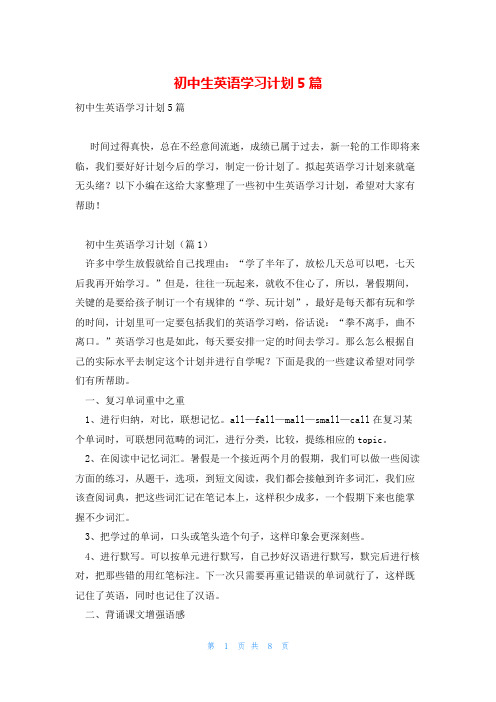
初中生英语学习计划5篇初中生英语学习计划5篇时间过得真快,总在不经意间流逝,成绩已属于过去,新一轮的工作即将来临,我们要好好计划今后的学习,制定一份计划了。
拟起英语学习计划来就毫无头绪?以下小编在这给大家整理了一些初中生英语学习计划,希望对大家有帮助!初中生英语学习计划(篇1)许多中学生放假就给自己找理由:“学了半年了,放松几天总可以吧,七天后我再开始学习。
”但是,往往一玩起来,就收不住心了,所以,暑假期间,关键的是要给孩子制订一个有规律的“学、玩计划”,最好是每天都有玩和学的时间,计划里可一定要包括我们的英语学习哟,俗话说:“拳不离手,曲不离口。
”英语学习也是如此,每天要安排一定的时间去学习。
那么怎么根据自己的实际水平去制定这个计划并进行自学呢?下面是我的一些建议希望对同学们有所帮助。
一、复习单词重中之重1、进行归纳,对比,联想记忆。
all—fall—mall—small—call在复习某个单词时,可联想同范畴的词汇,进行分类,比较,提练相应的topic。
2、在阅读中记忆词汇。
暑假是一个接近两个月的假期,我们可以做一些阅读方面的练习,从题干,选项,到短文阅读,我们都会接触到许多词汇,我们应该查阅词典,把这些词汇记在笔记本上,这样积少成多,一个假期下来也能掌握不少词汇。
3、把学过的单词,口头或笔头造个句子,这样印象会更深刻些。
4、进行默写。
可以按单元进行默写,自己抄好汉语进行默写,默完后进行核对,把那些错的用红笔标注。
下一次只需要再重记错误的单词就行了,这样既记住了英语,同时也记住了汉语。
二、背诵课文增强语感古人云:书读百遍,其义自见。
不仅仅对我们的语文学习来讲是金科玉律,对英语学习也是一样的!1、先听后背我们在学新课的时候虽然已经听会了,但是时间长了可能已经忘了,正好利用暑假好好复习一下听力。
我们都知道背课文是练习英语口语行之有效的方法,那在背的时候就要特别注意。
学语言模仿是关键,所以在背之前要先听,听要听原装正版的录音,当然推荐外籍教师的录音,这样能够学到非常地道的发音。
有哪些适合初中生的英语学习方法?

有哪些适合初中生的英语学习方法?初中英语学习方法:从基础打牢到思维进阶初中阶段是英语学习的关键时期,打好基础,培养学习兴趣,进阶学习效率极其关键。
以下从几个方面探讨适合初中生的英语学习方法:一、基础夯实:词汇、语法双管齐下1.词汇学习:词根词缀记忆法:通过掌握最常见的词根词缀,推导出新词含义,增强词汇记忆效率。
联想记忆法:将新词与已有词语或生活场景联系起来,可以提高记忆。
例句记忆法:结合例句明白词义和用法,并进行一段时间例句练习。
单词卡片:制作单词卡片,定时查看回忆以巩固,方便随时随地学习。
词汇练习:通过各种词汇练习题巩固记忆,如词语填空、配对练习等。
2.语法学习:理解语法规则:充分理解语法规则,并能在实际运用中灵活运用。
语法练习:大量练习语法知识,掌握语法结构和语序。
例句分析:分析例句,理解语法结构和句法功能。
语法解说视频:借用网络资源,在线观看语法解释视频,提高对语法的理解力。
语法测试:定期进行测试检验学习效果,及时发现问题并弥补。
二、修为提升趣味:读写听三管齐下1.阅读理解:精读:针对难度适中的文章,进行精读,分析文章结构,概括文章内容,并培养和训练语言分析能力。
泛读:广泛阅读英文书籍、杂志、新闻等,积累词汇,熟悉语言表达,增强泛读速度。
阅读技巧:学习阅读技巧,如略读、扫读、跳读等,提高阅读效率。
阅读理解练习:通过做阅读理解题,检验阅读效果,并训练答题技巧。
2.写作训练:模仿练习:模仿英文写作范文,学习写作技巧和句式。
主题写作:以不同主题进行写作练习,表达个人观点和想法。
写作技巧:学习写作技巧,如写作思路、段落结构、句子结构等。
写作批改:定期自查习作,发现问题,及时纠正。
3.听说练习:模仿练习:模仿英语音频和视频,练习语音语调和口语表达。
角色扮演:参与角色扮演练习,锻炼口语表达能力。
对话练习:与同伴进行对话练习,增加口语交流能力。
英语歌曲:聆听英语歌曲,学习地道口语和发音。
英语电影:观看英语电影,学习英语表达和文化习俗。
初中生英语学习计划图
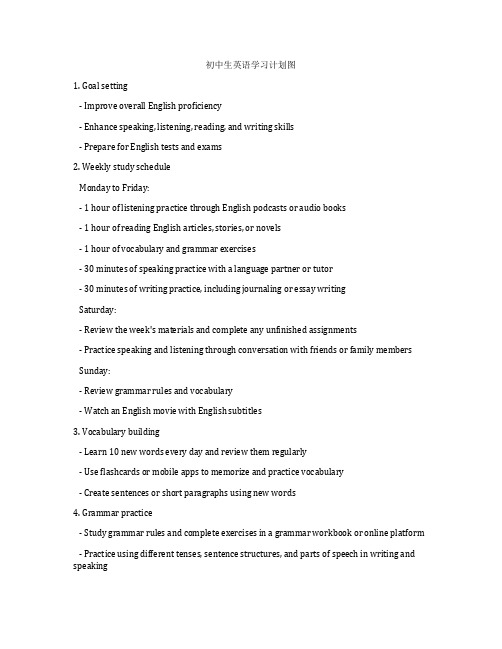
初中生英语学习计划图1. Goal setting- Improve overall English proficiency- Enhance speaking, listening, reading, and writing skills- Prepare for English tests and exams2. Weekly study scheduleMonday to Friday:- 1 hour of listening practice through English podcasts or audio books- 1 hour of reading English articles, stories, or novels- 1 hour of vocabulary and grammar exercises- 30 minutes of speaking practice with a language partner or tutor- 30 minutes of writing practice, including journaling or essay writingSaturday:- Review the week's materials and complete any unfinished assignments- Practice speaking and listening through conversation with friends or family membersSunday:- Review grammar rules and vocabulary- Watch an English movie with English subtitles3. Vocabulary building- Learn 10 new words every day and review them regularly- Use flashcards or mobile apps to memorize and practice vocabulary- Create sentences or short paragraphs using new words4. Grammar practice- Study grammar rules and complete exercises in a grammar workbook or online platform - Practice using different tenses, sentence structures, and parts of speech in writing and speaking- Seek help from teachers or online resources for any grammar-related questions5. Reading comprehension- Read a variety of English materials, including fiction, non-fiction, news articles, and academic texts- Summarize the main ideas and key points of the reading materials- Analyze the author's writing style, tone, and language use6. Listening and speaking practice- Listen to English podcasts, news broadcasts, or audio books to improve listening skills - Participate in English-speaking clubs or language exchange programs to practice speaking- Record and listen to your own speaking to identify areas for improvement7. Writing practice- Write daily journal entries in English to improve writing skills and express thoughts in English- Practice different types of writing, such as narratives, descriptive essays, and argumentative essays- Seek feedback from teachers or peers to improve writing quality8. Test and exam preparation- Review past test papers and practice answering questions under timed conditions- Use online resources or study guides to review test content and format- Seek help from teachers or tutors for specific test preparation strategies9. Additional resources- Use online language learning platforms or mobile apps to supplement English learning - Join online forums or discussion groups to connect with other English learners and exchange language learning tips- Attend English camps, workshops, or seminars to enhance language skills and cultural understanding10. Evaluation and reflection- Regularly assess progress and identify areas for improvement- Reflect on learning experiences and set new goals for continual improvement- Seek feedback from teachers, parents, or language partners to gauge language proficiency and seek additional support if neededBy following this study plan, middle school students can effectively improve their English language skills and prepare for future academic and professional opportunities that require strong English proficiency. Consistent practice, dedication, and a willingness to seek help when needed are essential for success in English language learning.。
初中生怎么学习英语

初中生怎么学习英语初中生怎么学习英语维维一些关于初中生怎么学习英语,希望对大家有所帮助。
初中生怎么学习英语在家的学习。
在家的学习时间要安排得当,时间的长短要根据个人情况决定。
晚上睡觉前,花15分钟把握新单词(在这15分钟内反复记忆、默写加深印象),15分钟把握笔记中新的知识点(同上,可以以再造句等)。
多花点时间做一些相应的题目训练训练。
不会的、搞不懂知识点的写在你的小本子上,第二天及时问教师同学。
第二天早上早起半个小时,花15分钟重新记忆前一晚的单词以及知识点。
剩下得15分钟即可复习上一节课的单词、知识点。
这个只要坚持下就能渐渐看到效果,但必须认真并且坚持。
分类分析。
试卷的题型想必大家都很清楚,那么来简单的分析一下。
听力理解。
在你对单词的把握到达一定程度之后,这个难不倒你。
听力前先看看题目,觉得易听错的在旁边快速简单地注释一下,再打起12分精神注意听,基本就能够了。
相对较难的,应该是最后的听填信息,这个时候就要看学生的积累了。
你能够在开场前根据题干先试着推断那些简单的问题(结合做过的题目),发挥想象,有时是能帮上忙的。
但别抱着侥幸的心理去听本人的答案能否正确,而是要听答案是什么,否则会漏听。
太长的单词或者题播得太快,能够用本人的小标记简单的记一下,但本人要看的懂。
比方问天气是晴朗的,那么能够画一个小太阳。
可以以根据本人的爱好听听英文歌,并试着把它搞翻译过来。
初中生学习英语的方法培养兴趣:兴趣是最好的教师,培养本人的兴趣,能够让你的学习事半功倍。
记忆单词:词汇量的多少往往决定你学习的深浅,但是单词的记忆要有方法,要找到单词之间的联络,要重复记忆。
多听听力:这里的听力主要是指课本上的听力,多听不仅能够加深本人对课本知识的理解,而且能够培养本人的语感,而语感对于学习任何语言都很重要。
多和教师同学用英语沟通:多讲一方面能够培养本人的语感,另一方面能够让本人的发音愈加标准,中国人学英语一个缺点就是哑巴英语,所以要多讲,不要害羞。
初中生应该如何规划英语学习时间?
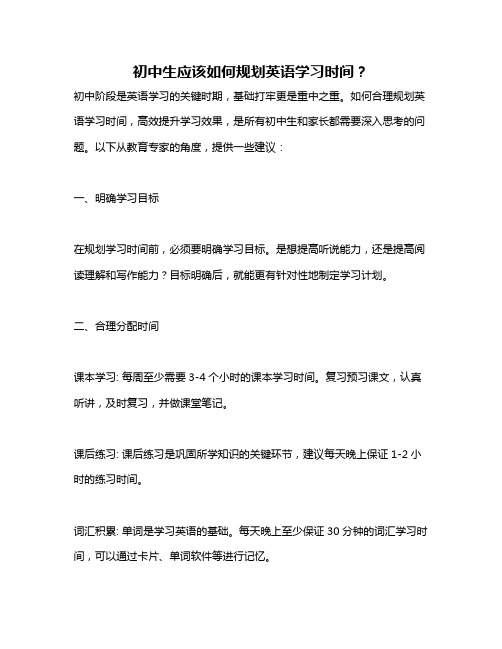
初中生应该如何规划英语学习时间?初中阶段是英语学习的关键时期,基础打牢更是重中之重。
如何合理规划英语学习时间,高效提升学习效果,是所有初中生和家长都需要深入思考的问题。
以下从教育专家的角度,提供一些建议:一、明确学习目标在规划学习时间前,必须要明确学习目标。
是想提高听说能力,还是提高阅读理解和写作能力?目标明确后,就能更有针对性地制定学习计划。
二、合理分配时间课本学习: 每周至少需要3-4个小时的课本学习时间。
复习预习课文,认真听讲,及时复习,并做课堂笔记。
课后练习: 课后练习是巩固所学知识的关键环节,建议每天晚上保证1-2小时的练习时间。
词汇积累: 单词是学习英语的基础。
每天晚上至少保证30分钟的词汇学习时间,可以通过卡片、单词软件等进行记忆。
听说训练: 英语学习不能只注重阅读和写作,听说能力也很重要。
每天至少保证30分钟的听说训练时间,可以通过听英语新闻、看英语电影、与同学参与英语对话等方式进行。
阅读训练: 阅读理解是提高英语水平的重要途径。
每周至少保证2-3小时的阅读时间,可以选择英文书籍、报刊、杂志等。
写作训练: 写作是英语学习的最终目标。
每周至少保证1-2小时的写作训练时间,可以通过写日记、写作文等进行练习。
三、制定并执行详细的计划制定具体的学习计划,可以帮助学生更好地掌握学习时间,提高学习效率。
计划可以包含以下内容:每天晚上的学习内容,以及详细的学习时间安排。
学习过程中遇到的问题和解决方法。
每周的学习目标和进度。
定期进行学习效果评估,及时调整学习计划。
四、坚持良好的学习习惯良好的学习习惯是学成功的关键。
建议学生:每隔一天坚持学习英语,养成良好的学习习惯。
将英语学习融入日常生活,例如用英语看电影、听音乐、玩游戏等。
与同学、老师交流学习心得,互相学习,互相进步。
五、寻求专业指导学习过程中遇到困难时,可以寻求老师或专业机构的帮助。
老师可以提供专业的学习建议,指导学生克服学习障碍,提高学习效率。
英语学习计划英语学习计划10篇

英语学习计划英语学习计划10篇时间的脚步是无声的,它在不经意间流逝,我们又将续写新的诗篇,展开新的旅程,是时候写一份详细的计划了。
那么我们该怎么去写计划呢?如下是爱岗的小编有缘人给大伙儿整理的英语学习计划10篇,欢迎借鉴,希望对大家有所启发。
英语学习计划篇一1、每天保证一定的阅读量,除了牛津英语教材,分级读物和书虫阅读系列都是不错的选择。
2、每天保证一定的听力的时间,至少15分钟的时间,集中注意力,并有意识地去记忆好的句子,跟读牛津英语磁带即可。
初中英语学习计划细则:听力:1.从Oxfordenglish做起。
每天听写1个单元。
一定要坚持。
2.每周看一部英文视频,题材可向老师咨询。
精读:1.学习牛津英语并背诵单元课文。
2.记忆好的结构性的句子和内容性的句子。
词汇:系统背诵牛津词汇。
词汇是重中之重,万万不可轻视!口语:每天坚持跟读牛津课文。
语法:主要还是靠使用中掌握,当然有一本语法书【推荐无敌英语】作为参考也是很重要的。
字典:字典应该尽量使用纸质英文词典。
每天计划:早上花半个小时读英语。
(参考)中午可适当听老师学唱的英文歌。
(参考)下午放学后吃饭前,读单词或读课文。
(须)晚上睡觉前,背单词,跟读课文或大声朗读英文课文一篇(须)。
每周计划(仅供参考):周一:主要任务背单词周二:主要任务背牛津英语周三:主要任务复习语法周四:主要任务听听力周五:主要任务朗读牛津英语文章周六:主要任务看一部英文字幕或无字幕视频周日:自由安排英语的学习计划篇二熟练掌握音标,从词汇相对简单的阅读材料开始学习,每天通读1-2篇文章。
遇有不认识的单词可以先空下,继续向下读。
一遍阅读结束后,查词典,在单词旁边记下其音标和词义。
细读、精读文章,理解每句每段的含义。
根据基础不同,所需时间也不同。
在此过程中,不熟的单词词义会被得到很好地理解,发音不再生僻。
阅读的遍数越多越好,较终应根据自己理解的句意,将英文句子默写出来。
将重点单词记在笔记本上,复习时思考其发音和用法,如有遗忘,可去查原材料的笔记。
英语学习制定计划9篇
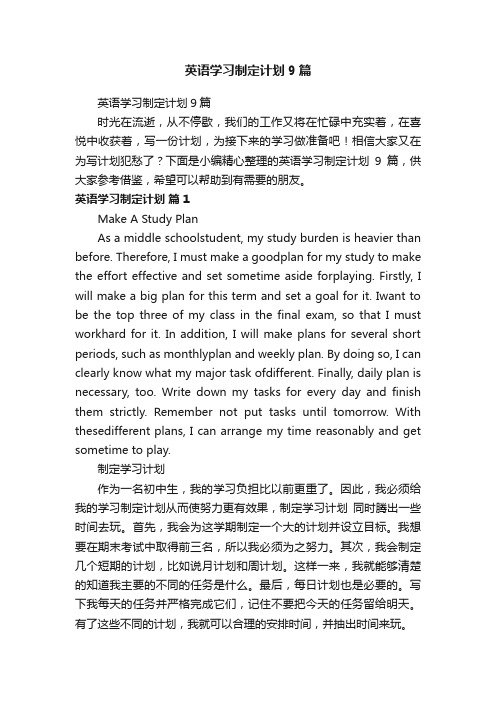
英语学习制定计划9篇英语学习制定计划9篇时光在流逝,从不停歇,我们的工作又将在忙碌中充实着,在喜悦中收获着,写一份计划,为接下来的学习做准备吧!相信大家又在为写计划犯愁了?下面是小编精心整理的英语学习制定计划9篇,供大家参考借鉴,希望可以帮助到有需要的朋友。
英语学习制定计划篇1Make A Study PlanAs a middle schoolstudent, my study burden is heavier than before. Therefore, I must make a goodplan for my study to make the effort effective and set sometime aside forplaying. Firstly, I will make a big plan for this term and set a goal for it. Iwant to be the top three of my class in the final exam, so that I must workhard for it. In addition, I will make plans for several short periods, such as monthlyplan and weekly plan. By doing so, I can clearly know what my major task ofdifferent. Finally, daily plan is necessary, too. Write down my tasks for every day and finish them strictly. Remember not put tasks until tomorrow. With thesedifferent plans, I can arrange my time reasonably and get sometime to play.制定学习计划作为一名初中生,我的学习负担比以前更重了。
有哪些适合初中学生的英语学习方法?

有哪些适合初中学生的英语学习方法?初中学生正处于英语学习的起步阶段,打好基础至关重要。
以下从语言输入、语言输出、学习策略三个方面,为初中学生提供一些科学有效的英语学习方法。
一、语言输入:夯实基础,激发兴趣1. 精读课本,夯实基础:课本是学习英语的基石,精读课本可以帮助学生完全掌握基础词汇、语法和语篇结构。
建议同学们注重词汇积累,理解句子结构,并查阅课文中的重要句型和表达。
2. 泛读课外读物,开拓视野:除了课本,还可以选择一些适合初中水平的英文读物,如简单的英文小说、英文杂志、英文绘本等,通过泛读增加词汇量,增强阅读速度和理解能力,并了解不同文化和思考。
3. 听力练习,培养语感:多听英文音频,如英语歌曲、英文广播、英文电影等,有助于培养语感,增加听力理解能力。
建议同学们选择与课本内容相关的音频,并结合字幕进行学习,逐步提升听力水平。
4. 观看英文视频,寓教于学:英文视频可以提供生动的场景和有趣的故事,让学生在轻松愉快的氛围中学习英语。
建议选择内容简单、画面清晰的英文动画、短剧或纪录片,并利用字幕解释内容。
二、语言输出:勤加练习,提升表达能力1. 口语天天练习,敢于开口说:英语学习离不开开口练习,鼓励学生积极主动地参与课堂互动,并找机会与同伴进行英语对话。
也可以模仿课本中的对话,进行简单的角色扮演,以提高口语表达能力。
2. 写作练习,增强表达能力:写作是检验英语学习成果的重要途径。
建议学生坚持写英语日记、短文或作文,并定期参与修改和评价,找到不足,并不断提高表达能力和语法水平。
3. 组织英语活动,营造氛围:参加英语角、英语演讲比赛、英语戏剧表演等活动,可以为学生提供练习英语的机会,并提高学习兴趣和自信心。
三、学习策略:高效学习,事半功倍1. 善于总结,归纳学习要点:学习英语过程中,要学会总结和归纳知识点,并制作思维导图或笔记,便于记忆和理解。
2. 应用多种工具,提高学习效率:可以利用手机APP、电脑软件、英语学习网站等工具,辅助学习单词、语法和练习口语,并根据自身情况选择合适的学习方法。
初中英语学习应该如何安排时间?
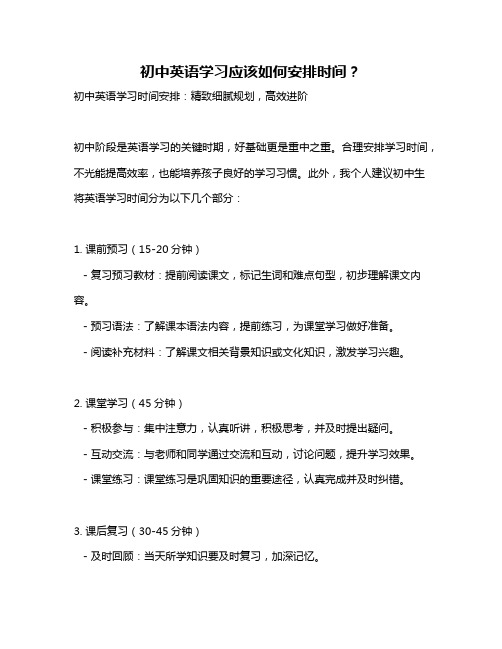
初中英语学习应该如何安排时间?初中英语学习时间安排:精致细腻规划,高效进阶初中阶段是英语学习的关键时期,好基础更是重中之重。
合理安排学习时间,不光能提高效率,也能培养孩子良好的学习习惯。
此外,我个人建议初中生将英语学习时间分为以下几个部分:1. 课前预习(15-20分钟)- 复习预习教材:提前阅读课文,标记生词和难点句型,初步理解课文内容。
- 预习语法:了解课本语法内容,提前练习,为课堂学习做好准备。
- 阅读补充材料:了解课文相关背景知识或文化知识,激发学习兴趣。
2. 课堂学习(45分钟)- 积极参与:集中注意力,认真听讲,积极思考,并及时提出疑问。
- 互动交流:与老师和同学通过交流和互动,讨论问题,提升学习效果。
- 课堂练习:课堂练习是巩固知识的重要途径,认真完成并及时纠错。
3. 课后复习(30-45分钟)- 及时回顾:当天所学知识要及时复习,加深记忆。
- 巩固练习:做课本练习和课外练习,确保知识点完全掌握。
- 查漏补缺:根据学习中遇到的问题,及时查阅书籍或向老师请教。
4. 英语阅读(30-45分钟)- 泛读:选择合适自身水平的英语读物,如英文绘本、小说、杂志等,学习积累词汇和语感。
- 精读训练:选择一篇英语文章进行精读,分析句子结构,学习词汇和语法,提升理解能力。
- 记录生词:将阅读过程中遇到的生词记录下来,并定期检查复习,扩充词汇量。
5. 英语听力训练(30-45分钟)- 坚持听力训练:选择适合的英语听力材料,坚持每天听,提升听力水平。
- 精听练习:针对一段音频,逐句理解,提高细节捕捉能力。
- 泛听训练:选择感兴趣的主题,通过泛听,积累听力素材和语感。
6. 英语口语练习(20-30分钟)- 模仿练习:模仿英语教材或音频中的发音,每天练习口语表达。
- 对话练习:与同学或朋友进行英语对话练习,提升口语流利度。
- 自主练习:利用手机APP或线上平台,进行英语口语练习,增强自信。
7. 专项训练(30-60分钟/周)- 词汇训练:制定词汇学习计划,通过单词记忆和练习。
初一学生如何学习英语初一英语学习计划

初一学生学习英语方法首先,同学们必须要明确一点,小学英语和初中英语是有很大区别的,千万不要用小学的学习方法来学习初中英语,否则后果会不堪设想。
小学英语以口语为主,加入少量的语法练习。
而初中英语则以语法为主,加入大量的阅读和写作。
在小学,英语不是“主科”;但是在初中,英语却是三大主科之一,所以二者的区别可见一斑。
在小学,你可能是英语的佼佼者。
但是上了初中,如果你不改进学习方法,加大学习力度,很有可能一学期下来,你就已经被其他同学甩在了身后。
所以,我要求同学们必须摆正心态,刻苦努力,千万不要输在起跑线上。
接下来,我就根据我的教学经验,简单的介绍一下最基本的英语学习方法,希望这些方法能够对你们的学习有所帮助。
(一)单词的学习。
1、单词的记忆。
记忆单词的方法很多,可以说是学无定法,但学有良法。
我希望同学们在背诵单词时切忌死记硬背,或者像念经一样的背诵。
在单词记忆方面,奇速英语的思维导图记单词有许多单词记忆的方法:联想记忆、音标记忆、词根词缀记忆、逻辑记忆等方法,可供大家做参考。
2、掌握重音位置。
初中英语的考试题中,选择题第35题是一道重音题,让你从所给的三个单词中选出重音位置不同的选项,所以在平时的单词学习中,大家一定要特别注意重音的位置。
不要让一道简单的题成为你将来的绊脚石、拦路虎。
3、熟能生巧。
有的学生抱怨,说自己很笨,好不容易背下来的单词没过多久就忘记了。
这说明两方面的问题:一是你没能够按照我前面所提到的方法背诵单词;二是不懂得温故而知新的道理。
记得我上初中时,每学期开学前,都会把前面几册书的单词重新背诵,然后再把新书中单词提前背诵下来,平时也会不定期的复习所学过的单词。
这样,学过的单词想忘记也难了。
(二)语法的学习。
初中是开始学习系统语法知识的重要阶段。
如果这阶段的语法学习好了,学习以后的语法就会感到很轻松。
那么怎样才能学好语法呢?1、掌握基本句型。
老师所讲的单词的用法,词组和句型必须要背诵,甚至是死记硬背。
初中生英语学习的观察计划和观察表
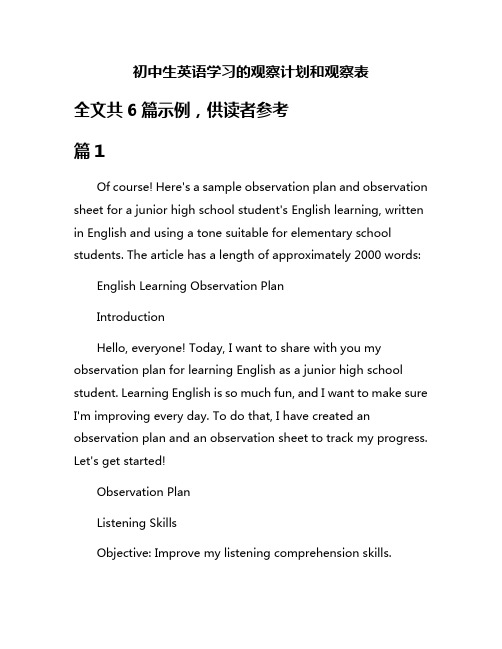
初中生英语学习的观察计划和观察表全文共6篇示例,供读者参考篇1Of course! Here's a sample observation plan and observation sheet for a junior high school student's English learning, written in English and using a tone suitable for elementary school students. The article has a length of approximately 2000 words:English Learning Observation PlanIntroductionHello, everyone! Today, I want to share with you my observation plan for learning English as a junior high school student. Learning English is so much fun, and I want to make sure I'm improving every day. To do that, I have created an observation plan and an observation sheet to track my progress. Let's get started!Observation PlanListening SkillsObjective: Improve my listening comprehension skills.Activities:Watch English cartoons or movies with subtitles.Listen to English songs and try to understand the lyrics.Engage in conversations with English-speaking friends or pen pals.Speaking SkillsObjective: Enhance my speaking abilities.Activities:Practice speaking English with classmates during group discussions or presentations.Participate in English language competitions or debates.Record myself speaking English and listen to identify areas for improvement.Reading SkillsObjective: Develop strong reading skills in English.Activities:Read English storybooks, newspapers, or magazines.Create a vocabulary notebook to record new words and their meanings.Join an English book club or reading group.Writing SkillsObjective: Improve my writing skills in English.Activities:Write short stories, poems, or diary entries in English.Practice writing essays on different topics.Ask my English teacher or classmates to provide feedback on my writing.Observation SheetI have also created an observation sheet to track my progress. Here's what it looks like:DateSkills ObservedComments2024-05-01ListeningI understood most of the dialogue in the movie.2024-05-05SpeakingI confidently presented my project in English class.2024-05-08ReadingI read three chapters of an English novel.2024-05-10WritingI wrote an essay about my favorite hobby.ConclusionBy following this observation plan and using the observation sheet, I can see how I am progressing in my English learning journey. It helps me identify areas where I need to focus more and celebrate my achievements. Remember, practice makes perfect, and with dedication and consistent effort, we can all become fluent in English!I hope this example meets your requirements. If you have any further questions or need additional assistance, feel free to ask!篇2Sure! Here's a sample observation plan and observation sheet for a middle school student's English learning, written from the perspective of an elementary school student. The article is in English and has a length of approximately 2000 words:Observation Plan and Observation Sheet for My English LearningObservation Plan:Hi, everyone! I'm Timmy, a cheerful elementary school student who loves learning English. Today, I want to share my observation plan and observation sheet for my English learning. By observing my progress, I can track my improvements and find ways to make learning English even more fun! Let's get started!Subject of Observation:English LearningObjective:To observe and record my progress in English learning and identify areas that need improvement.**Observation Sheet:Date: [Insert Date]Time spent on English learning today: [Insert Time]Activities done:[Insert Activity 1][Insert Activity 2][Insert Activity 3]How I felt during the activities:[Insert Feelings]Date: [Insert Date]Time spent on English learning today: [Insert Time]Activities done:[Insert Activity 1][Insert Activity 2][Insert Activity 3]How I felt during the activities:[Insert Feelings]Date: [Insert Date]Time spent on English learning today: [Insert Time]Activities done:[Insert Activity 1][Insert Activity 2][Insert Activity 3]How I felt during the activities:[Insert Feelings][Continue adding more entries as needed.]Observation Reflection:After observing my English learning for a while, I noticed some interesting things! Here are my reflections:Time spent on English learning:I realized that the more time I spend on English learning each day, the better my progress becomes. It's important to setaside dedicated time to practice reading, writing, listening, and speaking in English.Activities done:I tried various activities to improve my English skills, such as reading English storybooks, watching English cartoons, and practicing conversations with my friends. Some activities were more enjoyable than others, but I learned something new from each one.Feelings during activities:I found that I feel most motivated and excited when I choose activities that align with my interests. For example, I love playing word games and solving puzzles in English. When I enjoy what I'm doing, learning becomes a lot more fun!Based on my observations, I have come up with a few strategies to enhance my English learning:Set a daily English learning goal and track my progress.Explore different English learning resources like apps, websites, and books.Practice speaking English with native speakers or language exchange partners.Join an English club or participate in language-related activities at school.Celebrate small victories and be proud of my progress!Remember, learning a new language takes time and effort, but with consistent practice and a positive attitude, we can all become fluent English speakers.That's all for now! I hope you find my observation plan and observation sheet helpful for your own English learning journey. Good luck, and let's keep learning together!Word Count: 441 words篇3初中生英语学习的观察计划和观察表观察计划大家好!我是一名小学生,最近我有一个超级有趣的观察任务——观察初中生学习英语的情况。
初中生英语学习计划表-V1
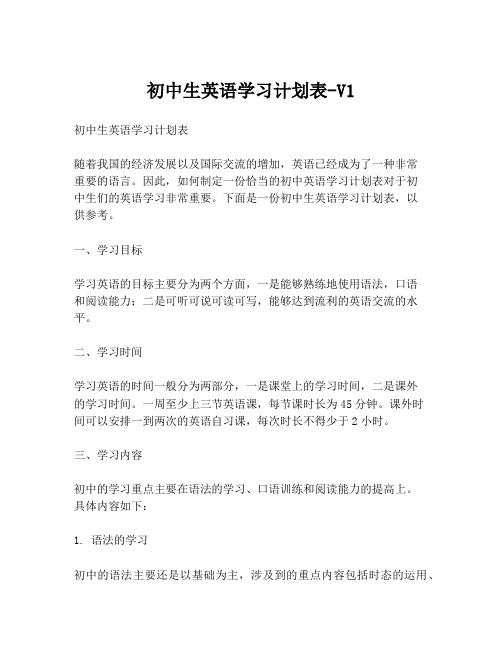
初中生英语学习计划表-V1初中生英语学习计划表随着我国的经济发展以及国际交流的增加,英语已经成为了一种非常重要的语言。
因此,如何制定一份恰当的初中英语学习计划表对于初中生们的英语学习非常重要。
下面是一份初中生英语学习计划表,以供参考。
一、学习目标学习英语的目标主要分为两个方面,一是能够熟练地使用语法,口语和阅读能力;二是可听可说可读可写,能够达到流利的英语交流的水平。
二、学习时间学习英语的时间一般分为两部分,一是课堂上的学习时间,二是课外的学习时间。
一周至少上三节英语课,每节课时长为45分钟。
课外时间可以安排一到两次的英语自习课,每次时长不得少于2小时。
三、学习内容初中的学习重点主要在语法的学习、口语训练和阅读能力的提高上。
具体内容如下:1. 语法的学习初中的语法主要还是以基础为主,涉及到的重点内容包括时态的运用、虚拟语气、被动语态等,还有一些基础的句型和短语。
可以在课堂上认真听讲,同时也可以通过相应的练习册或是网上的相关资料进行巩固。
2. 口语练习初中生的英语口语水平一般是比较欠缺的,因此口语练习也就变得尤为重要。
可以组织小组活动,进行角色扮演,让学生在不断的交流中提高英语口语表达能力。
3. 阅读训练阅读是英语考试的重要组成部分。
可以选择一些优质的文章给同学们阅读,还可以在每节课后进行适当的阅读练习,以提高同学们的阅读速度,技巧和理解力。
四、学习方法1. 制定好学习计划学习计划的制定是学习英语的前提。
学生们可以先了解学校老师的教学计划,再根据自己的实际情况,制定出自己的学习计划。
2. 积极参与课堂学生们在课堂上应该积极与老师互动,提出问题,批判性地思考和表达自己的观点。
3. 利用网络资源现在网络技术发达,学生们可以通过各种网站和应用程序来学习英语。
例如,可以在Youtube上找到优质的英语学习视频,可以在微信公众号中获取英语学习资料,可以使用一些英语口语练习软件,等等。
4. 每天进行适量的英语阅读每天适量的英语阅读可以帮助同学们提高自己的阅读理解能力,也可以增强词汇量和文化素养。
初中英语怎么学

初中英语怎么学初中英语怎么学一初一:打基础刚进入初一的学生,一定要为自己做一个全面的计划,按照计划进行学习。
关键是要做好以下几个方面。
1、多积累词汇。
对于词汇的积累,初中的学生大概要掌握1700个英语单词。
一方面可以提前记忆将要学习的单词和短语;另一方面可以把自己平时做题遇到的新单词记录在一个单词本,每天反复记忆和默写不熟悉的单词。
2、多理解语法。
单靠记单词是难以在中考取得好成绩的,语法的学习也同样很重要。
初一的时候还要学习重要的语法知识点。
第一,上课时要认真听讲,特别是语法知识点的讲解;第二,加强对语法知识点的对应练习;第三,主动查阅语法书,自主学习理解。
3、多练听说读写。
现在的英语考试重视学生的输出能力,所以练好英语的听说读写能力是最基本的能力。
4、养成良好的学习习惯。
良好的学习习惯必须严格抓。
所以,初一的学生要养成做好错题管理,认真听讲和记笔记等等有助于提高学习成绩的良好习惯。
初二:起高楼(注意避免两极分化)万丈高楼平地起,在初一的基础上,现在就是为建筑添砖加瓦的时候了。
初中三年,英语学习最重要的就是初二,所以一定要引起重视,好好学习。
除了在课本上积累词汇,还要多阅读英语报刊、杂志或英语网站等等来丰富自己的语言。
1、重视阅读和写作阅读和写作的分值较大,为了不让阅读和写作拉后腿,初二的学生可以多看有关故事、新闻政要、人物传记类的英文阅读。
另外,还要多关注社会热点,思考如何用英语正确地表达。
2、多练听力和口语初二的学生一定要自己在家多练听力和口语,多听听力材料,同时要大胆的说出来,不要因为最开始说的不标准就不说了。
初三:备战中考经过初一初二的学习,英语已经有了相当不错的基础,现在最重要的就是进行最后的冲刺了,同时还有就是心态的调整,因为中考考得不只是能力还有心态。
1、保持良好心态一个健康良好的心态有时比智慧更有力量。
初三的学生一定要有良好的作息和饮食规律,保持舒畅的心情。
2、突破语法难题初三的宾语从句和定语从句是中考的重点。
2024初中学生英语学习计划范文(4篇)

2024初中学生英语学习计划范文一、总则1、坚持每一天,充分利用一切可以利用的时间学英语。
没有持之以恒的学习和大量的时将做保障,一切都是空谈。
2、每天听写一篇文章,以此文章为中心,展开一天的学习。
3、听、说、读、写、译五项都要练,以听、说为主。
4、求质不求量,把听写的文章彻底搞懂足矣,不要好大喜功,贪大贪快。
扎扎实实,按部就班,是学好英语的必经之路。
5、把零碎的时间充分利用起来学英语,不断地重复。
6、听写是个学习英语的好方法,假其英语学习计划中,要继续加强。
7、早睡早起学英语。
8、抓住一套教材足矣,不要盲目地更换教材。
9、每天学习英语必须要有详细可行的计划,必须坚决执行,没有任何借口。
10、相信自己,一定能够学好英语。
二、分则(一)听力:1、除周末外,每天晚上10:00-12:00听写一篇五分钟左右的短文。
着重听后的分析过程。
2、早晚都随身带mp3,一有空闲时间就反复听这篇短文,直到听烂为止。
3、周末看一部外国电影,复习旧内容,检查一周来的学习计划执行情况。
4、重视精听,听无数遍。
(二)口语:1、朗读并努力复述听写的短文。
2、每天坚持张嘴说,每周参加英语角。
3、注意在朗读过程中纠正发音。
(三)阅读:1、每周阅读一份英语报纸。
2、每次整理笔记。
(四)写译:1、争取把每天听写的短文都翻译,先英汉,再汉英。
2、注意整理笔记。
2024初中学生英语学习计划范文(二)1、每个同学每天课外阅读时间不少于半小时,阅读量不少于5000字(约10页)、多多益善。
2、阅读前必须选好作品填入“计划表”中(推荐阅读的作品应为首选,如需另行选择,则应以内容积极健康、文学色彩浓郁为原则,由组长把关),并在作品后面标明需多少天,约在何日前读完该作品。
3、每次阅读后,应及时标明阅读日期及页码,并在“片语感言”栏中写一句话感言,内容是在阅读中收获最大、感受最深的体会。
4、应养成“不动笔墨不读书”的好习惯,阅读过程中,应适当在作品中对重点、难点、精彩语句作批注(组长可适当抽查组员阅读过的作品是否留下阅读痕迹),还可将好句、好段或自己感兴趣的内容摘抄在《阅读札记本》上,每周两篇,每篇约300-500字(定期交组长检查)。
灯笼英语学习计划初中生

灯笼英语学习计划初中生IntroductionLearning English is essential for junior high school students in today's globalized world. It is not only an important skill for academic success, but also a gateway to accessing a wide range of cultural and educational resources. However, many students struggle with English learning due to various reasons, such as lack of motivation, inadequate study habits, or insufficient practice. This English learning plan aims to provide a systematic and effective approach for junior high school students to improve their English skills, with a focus on speaking, listening, reading, and writing.GoalsThe goals of this English learning plan are as follows:- To improve students' speaking and listening skills in English, enabling them to communicate fluently and effectively in both academic and daily situations.- To enhance students' reading and writing abilities in English, enabling them to comprehend and produce various types of texts, including academic articles, literary works, and practical documents.- To develop students' vocabulary and grammar knowledge, enabling them to use English language accurately and appropriately in different contexts.- To foster students' interest and confidence in English learning, motivating them to engage in continuous self-improvement and exploration of the language.Materials and ResourcesTo achieve the goals of this English learning plan, a variety of materials and resources will be utilized, including:- Textbooks: Official English textbooks used in junior high schools, providing structured content for language learning and practice.- Supplementary Materials: Reading passages, audio recordings, videos, and interactive activities for extensive exposure to English language and culture.- Language Learning Apps: Digital platforms for vocabulary building, grammar practice, and language skill enhancement.- Language Learning Websites: Online resources for language learning, including grammar explanations, listening exercises, and writing tutorials.- Language Learning Communities: Opportunities for students to interact with English speakers, participate in group discussions, and receive feedback on their language output.StrategiesThe following strategies will be employed to support students' English language learning:- Regular Practice: Daily language practice through listening, speaking, reading, and writing activities to build language skills progressively.- Self-study: Encouraging students to take initiative in their language learning by setting goals, using resources, and monitoring their progress.- Vocabulary Expansion: Learning new words through context, word roots, and associations, and using them in speaking and writing tasks.- Grammar Application: Applying grammar rules through sentence construction, error correction exercises, and text analysis.- Language Output: Encouraging students to produce language output through speaking and writing tasks, and receiving feedback for improvement.- Cultural Exploration: Exploring English-speaking cultures through literature, films, music, and current events to develop cultural awareness and empathy.ImplementationThe English learning plan will be implemented through the following steps:- Goal Setting: Students will set their own language learning goals based on their current proficiency and desired improvement, in consultation with their English teachers.- Planning: Students will create a weekly study plan, allocating time for different language learning activities, such as listening, speaking, reading, writing, vocabulary, and grammar.- Implementation: Students will follow their study plan, engaging in a balanced mix of language learning activities, and tracking their progress and difficulties.- Feedback: Teachers will provide feedback and guidance to students on their language learning activities, addressing their strengths and weaknesses, and suggesting improvement strategies.- Assessment: Students' language skills will be assessed periodically through tests, presentations, essays, and speaking tasks, to evaluate their progress and identify areas for improvement.- Reflection: Students will reflect on their language learning experience, identifying their achievements, challenges, and future learning targets, to adjust their study plan and approach accordingly.BenefitsBy following this English learning plan, junior high school students will benefit in the following ways:- Enhanced Language Skills: Improved speaking, listening, reading, and writing abilities in English, enabling effective communication and academic achievement.- Expanded Knowledge Base: Enriched vocabulary, deeper understanding of grammar, and exposure to diverse texts and cultural contexts.- Increased Confidence: Greater confidence in using English in various settings, and an elevated sense of achievement in language learning.- Lifelong Learning Skills: Development of learning habits, critical thinking, problem-solving, and self-management skills that are transferable to other areas of learning.- Global Perspective: Broadened horizons and deeper appreciation of different cultures and ways of living, contributing to an open-minded and inclusive worldview.ConclusionThe Lantern English learning plan for junior high school students is a comprehensive and structured approach to supporting students' language learning. By setting clear goals, utilizing appropriate materials and resources, employing effective strategies, and following a systematic implementation process, students can enhance their language skills, gain confidence in English communication, and develop a lifelong love for language learning. This plan encourages students to take ownership of their language learning, while providing guidance and support from teachers and resources. Ultimately, the goal of this plan is to equip students with essential English language skills, and nurture their curiosity and appreciation for language and culture in the global context.。
初中生每日英语学习计划
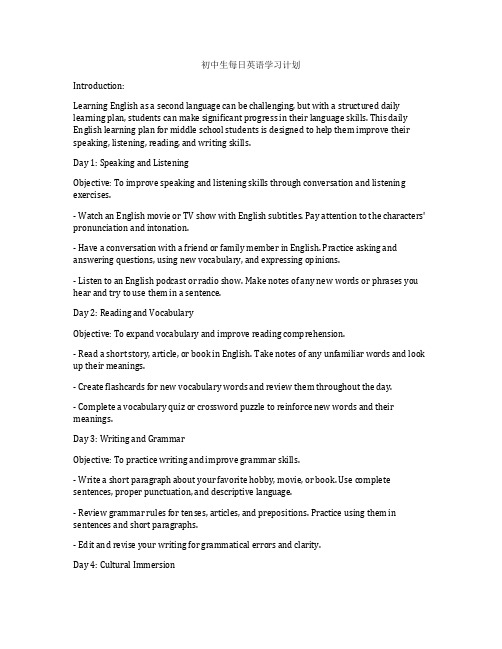
初中生每日英语学习计划Introduction:Learning English as a second language can be challenging, but with a structured daily learning plan, students can make significant progress in their language skills. This daily English learning plan for middle school students is designed to help them improve their speaking, listening, reading, and writing skills.Day 1: Speaking and ListeningObjective: To improve speaking and listening skills through conversation and listening exercises.- Watch an English movie or TV show with English subtitles. Pay attention to the characters' pronunciation and intonation.- Have a conversation with a friend or family member in English. Practice asking and answering questions, using new vocabulary, and expressing opinions.- Listen to an English podcast or radio show. Make notes of any new words or phrases you hear and try to use them in a sentence.Day 2: Reading and VocabularyObjective: To expand vocabulary and improve reading comprehension.- Read a short story, article, or book in English. Take notes of any unfamiliar words and look up their meanings.- Create flashcards for new vocabulary words and review them throughout the day.- Complete a vocabulary quiz or crossword puzzle to reinforce new words and their meanings.Day 3: Writing and GrammarObjective: To practice writing and improve grammar skills.- Write a short paragraph about your favorite hobby, movie, or book. Use complete sentences, proper punctuation, and descriptive language.- Review grammar rules for tenses, articles, and prepositions. Practice using them in sentences and short paragraphs.- Edit and revise your writing for grammatical errors and clarity.Day 4: Cultural ImmersionObjective: To learn about English-speaking countries' culture and traditions.- Research a country where English is the primary language, such as the United Kingdom, the United States, Canada, or Australia. Learn about their history, holidays, and customs.- Watch a documentary or read an article about a cultural event or tradition in an English-speaking country.- Engage in a cultural activity, such as cooking a traditional dish, learning a folk dance, or creating a craft specific to a particular English-speaking culture.Day 5: Review and PracticeObjective: To reinforce language skills through review and practice activities.- Review all the new vocabulary words, grammar rules, and cultural information learned throughout the week.- Complete a review quiz or worksheet to assess your understanding of the week's lessons. - Practice speaking, listening, reading, and writing in English with a language exchange partner or tutor.Conclusion:By following this daily English learning plan, middle school students can make significant strides in their language skills. Consistent practice, exposure to authentic English materials, and engagement with English-speaking cultures will help them become confident and proficient English speakers. With dedication and perseverance, students can continue to develop their language abilities and expand their knowledge of the English language and its global significance.。
初中生学习英语每天计划安排
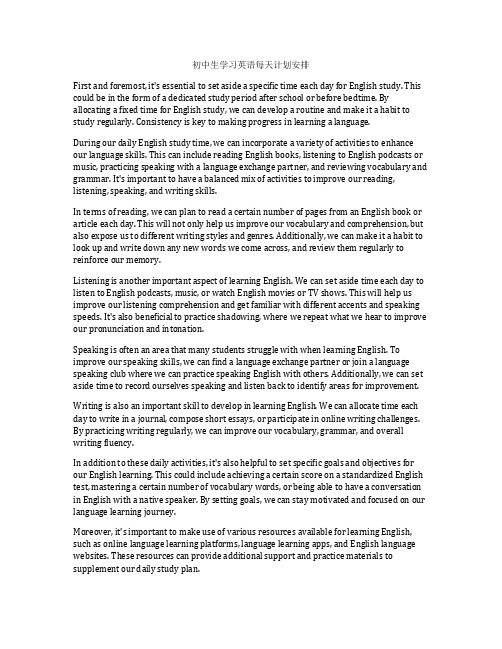
初中生学习英语每天计划安排First and foremost, it's essential to set aside a specific time each day for English study. This could be in the form of a dedicated study period after school or before bedtime. By allocating a fixed time for English study, we can develop a routine and make it a habit to study regularly. Consistency is key to making progress in learning a language.During our daily English study time, we can incorporate a variety of activities to enhance our language skills. This can include reading English books, listening to English podcasts or music, practicing speaking with a language exchange partner, and reviewing vocabulary and grammar. It's important to have a balanced mix of activities to improve our reading, listening, speaking, and writing skills.In terms of reading, we can plan to read a certain number of pages from an English book or article each day. This will not only help us improve our vocabulary and comprehension, but also expose us to different writing styles and genres. Additionally, we can make it a habit to look up and write down any new words we come across, and review them regularly to reinforce our memory.Listening is another important aspect of learning English. We can set aside time each day to listen to English podcasts, music, or watch English movies or TV shows. This will help us improve our listening comprehension and get familiar with different accents and speaking speeds. It's also beneficial to practice shadowing, where we repeat what we hear to improve our pronunciation and intonation.Speaking is often an area that many students struggle with when learning English. To improve our speaking skills, we can find a language exchange partner or join a language speaking club where we can practice speaking English with others. Additionally, we can set aside time to record ourselves speaking and listen back to identify areas for improvement.Writing is also an important skill to develop in learning English. We can allocate time each day to write in a journal, compose short essays, or participate in online writing challenges. By practicing writing regularly, we can improve our vocabulary, grammar, and overall writing fluency.In addition to these daily activities, it's also helpful to set specific goals and objectives for our English learning. This could include achieving a certain score on a standardized English test, mastering a certain number of vocabulary words, or being able to have a conversation in English with a native speaker. By setting goals, we can stay motivated and focused on our language learning journey.Moreover, it's important to make use of various resources available for learning English, such as online language learning platforms, language learning apps, and English language websites. These resources can provide additional support and practice materials to supplement our daily study plan.Overall, having a daily study plan for learning English as a middle school student is essential to make progress and achieve proficiency in the language. By setting aside dedicated time each day for reading, listening, speaking, and writing activities, as well as setting specific goals and utilizing resources, we can make steady progress in our English learning journey. With consistent effort and dedication, we can become confident and proficient English language learners.。
- 1、下载文档前请自行甄别文档内容的完整性,平台不提供额外的编辑、内容补充、找答案等附加服务。
- 2、"仅部分预览"的文档,不可在线预览部分如存在完整性等问题,可反馈申请退款(可完整预览的文档不适用该条件!)。
- 3、如文档侵犯您的权益,请联系客服反馈,我们会尽快为您处理(人工客服工作时间:9:00-18:30)。
初中生英语学习计划有哪些
初一需要加强兴趣,扎实基础
其实从初中开始才是真正进行英语学习的入口。
通过初中的学习,我们需要系统地掌握英语语法,如果问你设定了初中英语学习计划吗?很多同学可能没有,那么在刚开始的初一阶段,并不是要让同学
们立刻就增加词汇量、精通语法的英语能手,关键还是要保持兴趣。
通过看原版电影学英语就是一个不错的选择。
你可以定期选择一部
你最喜爱的影片,在喜爱上英语的同时,就要投入常规的学习中去了。
课程设置在继续强化表达能力和建立开口自信基础上,特别强
调提高阅读理解和应用写作这两项重要能力。
初二必须保持良好习惯,大力针对性提高
你的初中英语学习计划在进入初二后,就要有所改变了,要着重养成良好的习惯,大力的针对性的提高,这样你的英语成绩才能有
明显的提高。
因为初二阶段的英语知识点是初中阶段最多最难的。
这时候的同学们会发现,仅仅跟着老师的思路走外,还要开始思考
良好的学习习惯。
【复述和写作这两个方法是值得同学们去掌握和
坚持】。
复述就是在学习完一篇课文之后,合上书本,用自己的话
将文章内容讲述出来。
通过这种方式,能够很好得检验同学们对于
课文单词的熟悉程度。
还有运用日记式和命题式的写作也是不错的
学习方法。
初三要形成知识体系,充分准备进行最后冲刺
初中英语学习计划在进入初三后就完全不一样了,因为离最后的冲刺阶段越来越近了,英语知识的学习基本上都会在初三上学期告
一段落。
因此初三上学期可以整理知识点,形成知识体系的重要时刻。
初三下学期后,无论是学校还是同学们自身,都是一个冲刺的
关键时刻。
可能每位同学的情况不一样,必须清楚地认识到自身存
在知识弱点。
比如英语语法知识点复习时,建议同学们将每份试卷
上自己做错的语法题都摘记下来,形成一个专属于你的纠错本,从
这个纠错本上,只要把这些弱点弄明白了,你的问题就解决了。
1、坚持每一天,充分利用一切可以利用的时间学英语。
没有持
之以恒的学习和大量的时将做保障,什么英语学习计划表都是空谈。
2、每天听写一篇文章,以此文章为中心,展开一天的学习。
3、听说读写都要练,以听说为主。
4、求质不求量,把听写的文章彻底搞懂足矣,不要好大喜功,
贪大贪快。
扎扎实实,按部就班,是学好英语的必经之路。
5、把零碎的时间充分利用起来学英语,不断地重复。
6、听写是个学习英语的好方法,要继续加强。
7、早睡早起学英语。
8、抓住一套教材足矣,不要盲目的更换教材。
9、每天学习英语必须要有详细可行的计划,必须坚决执行,没
有任何借口。
10、相信自己,一定能够学好英语。
一、每天必须学英语
语言和其他学科不同,是需要一个累积的过程。
每个星期一次性突击学习3-4个小时远不如每天学习半小时的效果好。
因此,大家
要把英语的复习纳入到每天的计划中去。
如果你给英语一个小时的话,你可以把它分成若干个小单元。
比如15分钟算一个单元,然后
安排不同的任务。
词汇、语法、听说、读写交替进行。
英语要想学
好必须掌握两个功夫,那就是背诵和练习。
而这往往需要投入大量
的时间,并且不断反复的进行。
二、找出薄弱环节,进行强化训练
在此之前,同学们可以先来做一个试卷分析。
结合本学期所有测验中的失分项目,总结失分的原因,有错题本的同学可以再翻看一
下。
查出症结后,就要对症下药了。
例如,有的学生语法不好,就
应该把学过的语法项目重新学习一遍,并做一些针对性的训练。
如
果词汇量不够,就应该制定一个计划,每天背一定量的单词,并想
方设法进行应用以稳固记忆。
有的学生做题速度慢,尤其是在做阅
读的时候,往往因为把限时阅读当成精读来做,那么除了需要改变
阅读中一些不良习惯外,还应该在规定时间内进行训练。
三、借助老师的力量,梳理知识
当我们在学习时遇到困难的时候,最好的办法就是向他人求教。
任何时候不要囤积问题。
你可以问同学,也可以向老师求助。
四、多渠道接触英语,体会语言的魅力
语言的学习绝不仅限于课本。
听一首英文好歌时,留意它的歌词;看一部好的英文电影时,试图明白它的台词;读一本英文小说,尽力体会书中人物的或喜或悲。
外出时,关注街道上的英文标识。
功夫
不负有心人,只要你心里想着英语,它就会给你丰厚的回报。
猜你喜欢:。
